

The 75-Year Study That Found The Secrets To A Fulfilling Life. What if there was a study dedicated to unearthing the secrets to a happy and purposeful life?
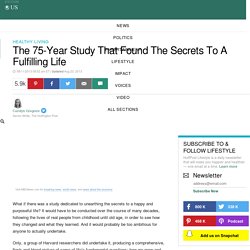
It would have to be conducted over the course of many decades, following the lives of real people from childhood until old age, in order to see how they changed and what they learned. And it would probably be too ambitious for anyone to actually undertake. Only, a group of Harvard researchers did undertake it, producing a comprehensive, flesh-and-blood picture of some of life’s fundamental questions: how we grow and change, what we value as time goes on, and what is likely to make us happy and fulfilled.
The study, known as the Harvard Grant Study, has some limitations — it didn’t include women, for starters. Still, it provides an unrivaled glimpse into a subset of humanity, following 268 male Harvard undergraduates from the classes of 1938-1940 (now well into their 90s) for 75 years, collecting data on various aspects of their lives at regular intervals. What Everyone Needs To Know About Their Chakras. Each of the seven chakras are governed by spiritual laws, principles of consciousness that we can use to cultivate greater harmony, happiness, and wellbeing in our lives and in the world.
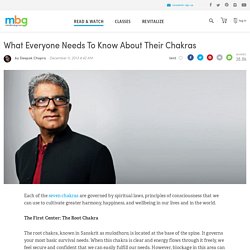
The First Center: The Root Chakra The root chakra, known in Sanskrit as muladhara, is located at the base of the spine. It governs your most basic survival needs. When this chakra is clear and energy flows through it freely, we feel secure and confident that we can easily fulfill our needs. However, blockage in this area can cause us to feel anxious and worried. The spiritual Law of Karma governs the first energy center. Consider the possibilities in front of you and listen to signals from your body. The Second Center: Creativity Chakra. The Science of Humor and the Humor of Science: A Brilliant 1969 Reflection on Laughter as Self-Defense Against Automation. By Maria Popova “Our life has become so mechanized and electronified that one needs some kind of an elixir to make it bearable at all.
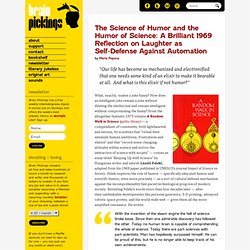
And what is this elixir if not humor?” What, exactly, makes a joke funny? How does an intelligent joke remain a joke without diluting the intellectual and remain intelligent without compromising the funny? From the altogether fantastic 1973 volume A Random Walk in Science (public library) — a compendium of comments, both lighthearted and serious, by scientists that “reveal their intensely human ambitions, frustrations and elation” and that “record some changing attitudes within science and mirror the interaction of science with society” — comes an essay titled “Keeping Up with Science” by Hungarian writer and satirist László Feleki, adapted from his 1969 paper published in UNESCO’s journal Impact of Science on Society.
How To Rest Your Mind. ~ Rose Taylor Goldfield. Indian teachers of yoga say that the Corpse Pose is the hardest yoga pose for Westerners.
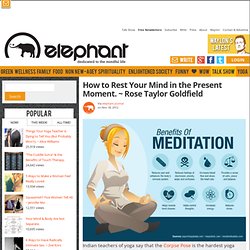
In Corpse Pose, we lie on the floor and surrender to the earth, leaving the body in perfect rest and stillness as though dead. But many of us have problems even with the pose of complete rest. We either fidget and shift our bodies or our mind gives up and goes to sleep. Being able to actually rest is an art for us to cultivate. Remember “RAIN” When You Feel Overwhelmed. 18 Fantastic Ways to Let Go. Letting go is the ultimate zen habit we all must master, sooner or later.
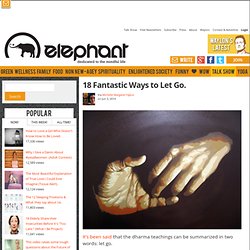
Letting go has also become somewhat of a cliche and is often misused in spiritual contexts. But it is the single most powerful, simple (not easy) skill we can cultivate in life. Let’s take a deeper look at what letting go isn’t and is—and some concrete ways to practice it. What Letting Go Isn’t. Letting go isn’t just cliche spiritual advice. Mindfulness: more than a fad, less than a revolution. Meditation is simply about being yourself, and knowing something about who that is. - Jon Kabat-Zinn.
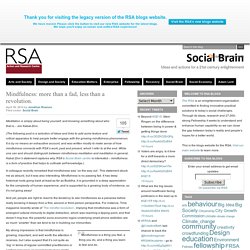
(The following post is a selection of ideas and links to add some texture and critical apparatus to help people better engage with the growing mindfulness phenomenon. It is by no means an exhaustive account, and was written mostly to make sense of how mindfulness connects with RSA’s work, past and present, which I refer to at the end. While one can and should distinguish between mindfulness meditation and meditation in general, Kabat Zinn’s statement captures why RSA’s Social Brain centre is interested – mindfulness is a form of practice that helps to cultivate self-knowledge.) A colleague recently remarked that mindfulness was ‘on the way out’. This statement struck me as absurd, but it was also interesting. John Searle: Our shared condition. 5 Ways To Love The Present No Matter How Scared You Are. Recently, a small black mole appeared on my ankle.

I had a sinking feeling when I saw it. A biopsy and a personal call from the doctor confirmed that the spot was indeed cause for concern and I would need surgery to remove a larger section of the surrounding tissue. I got the news the day before I left to lead a weeklong yoga retreat in Maui. I wouldn’t be able to practice yoga for at least three weeks after the procedure, so the doc told me to enjoy my vacation and we would schedule surgery when I got back. Enjoy my vacation? My mind instantly started spinning. Each thought was feeding on the negativity of the last, sending me down a deep, dark rabbit hole. In the Yoga Sutras, Patanjali tells us “Heyam duhkham anagatam.”